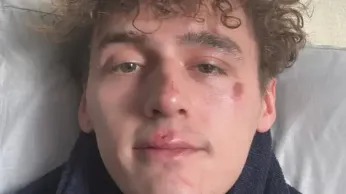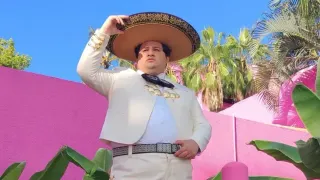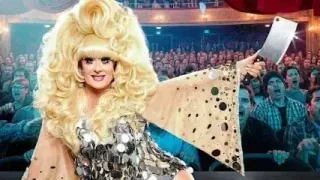
9 hours ago
"Big Brother"’s Cameron Cole Fights Back After Homophobic Assault: “You Will Not Win”
READ TIME: 3 MIN.
If you’ve ever been told to “just be yourself,” you know it’s both a promise and a dare—especially when your very existence puts you at risk. On what should have been a night of celebration, 2018 Big Brother winner Cameron Cole found himself face-to-face with the ugly reality of homophobia. While marking his birthday on October 31, Cole was separated from friends and violently attacked, left with a black eye and facial cuts—wounds that are both literal and symbolic in a country where LGBTQ+ hate crimes are again on the rise .
Posting candidly on Instagram, Cole wrote, “I had a beautiful birthday surrounded by love, yet still came face-to-face with people who chose hate and violence. They targeted me with homophobia and slurs, and later attacked me when I was alone. It shook me. It made me feel vulnerable in a way no one should ever have to feel, especially not for just existing and being me” .
Cole’s story is heartbreakingly familiar for too many LGBTQ+ people. His coming out on Big Brother at age 19 was a watershed TV moment, celebrated by queer audiences and allies alike for its unfiltered honesty and vulnerability—a reminder that every coming out is both a liberation and an exposure .
Yet the aftermath, as Cole himself has said, has not always been easy. “This isn’t just about me, or just about the LGBTQ+ community. It’s about every minority, every marginalised voice, everyone who has been told they don’t belong. The politics, the government, the people, they want to divide us but they will not win” .
His words echo a broader truth: that public visibility for queer people remains a double-edged sword. The more we’re seen, the more we’re often targeted. Home Office statistics released last month show a two percent rise in hate crimes in the UK for the year ending March 2025, with LGBTQ+ people disproportionately affected . Activist organizations like Stop Hate UK note that official figures are just the tip of the iceberg, as thousands more cases go unreported due to fear or lack of faith in authorities .
But if hate is loud, so too is queer resilience. In the days after the attack, Cole was inundated with messages of support from across the LGBTQ+ spectrum—proof that community care is real, and that no one fights alone. “I am still here. I am hurting but I am fighting. I am reminding myself of how far I have come and I am not allowing this to undo everything I have worked so hard to heal,” he posted, adding that the support “helped me feel less alone at a moment when I was slipping back into old darkness. Thank you for making me feel valued when I felt myself disappearing” .
There’s a sting in his next words: “I wish this kind of experience was rare. It should be, it is not, and that breaks my heart.” For many LGBTQ+ people, violence—verbal or physical—is an unwelcome but familiar intruder. Cole’s account is a rallying cry, not just for awareness, but for action. As he put it, “the attack has shaken me. But it’s given me a fire and fight to fight these people off. You will not win. Keep trying but you will fail” .
Cameron Cole’s refusal to shrink after an act of violence is a blueprint for queer endurance. His social posts—accompanied by images of his injuries—are not just a “look what happened to me” but an urgent, collective “look what’s still happening.” In a media landscape where homophobic attacks can be quickly forgotten, his willingness to speak out ensures the issue stays visible, urgent, and impossible to ignore.
It’s also a reminder: community is power. Whether you’re a reality TV star or just living your truth out loud, queer solidarity is how we fight back. For every act of hate, there’s a counter-current of care, creativity, and connection. As Cole’s friend (Instagram: @carz), who helped him after the attack, demonstrates, sometimes safety is found in chosen family .
For those reading who may be shaken by this news, support is available. UK-based organizations like Galop (0800 999 5428) and LGBT Foundation (0345 3 30 30 30) are there to help, offering a listening ear and practical resources for anyone who has experienced hate or violence .
Cameron’s story is a bruise on the face of progress, but it’s also a badge of survival. The message for the queer community is clear: we are still here, we are still fighting, and—despite everything—they will not win.






